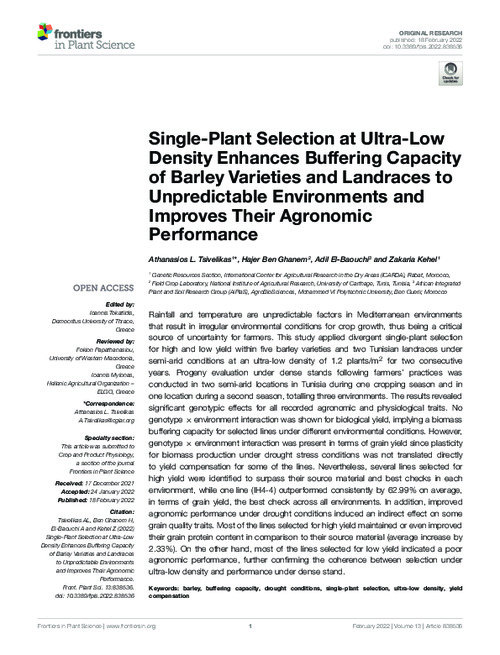Single-Plant Selection at Ultra-Low Density Enhances Buffering Capacity of Barley Varieties and Landraces to Unpredictable Environments and Improves Their Agronomic Performance
Abstract
Rainfall and temperature are unpredictable factors in Mediterranean environments
that result in irregular environmental conditions for crop growth, thus being a critical
source of uncertainty for farmers. This study applied divergent single-plant selection
for high and low yield within five barley varieties and two Tunisian landraces under
semi-arid conditions at an ultra-low density of 1.2 plants/m2 for two consecutive
years. Progeny evaluation under dense stands following farmers’ practices was
conducted in two semi-arid locations in Tunisia during one cropping season and in
one location during a second season, totalling three environments. The results revealed
significant genotypic effects for all recorded agronomic and physiological traits. No
genotype environment interaction was shown for biological yield, implying a biomass
buffering capacity for selected lines under different environmental conditions. However,
genotype environment interaction was present in terms of grain yield since plasticity
for biomass production under drought stress conditions was not translated directly
to yield compensation for some of the lines. Nevertheless, several lines selected for
high yield were identified to surpass their source material and best checks in each
environment, while one line (IH4-4) outperformed consistently by 62.99% on average,
in terms of grain yield, the best check across all environments. In addition, improved
agronomic performance under drought conditions induced an indirect effect on some
grain quality traits. Most of the lines selected for high yield maintained or even improved
their grain protein content in comparison to their source material (average increase by
2.33%). On the other hand, most of the lines selected for low yield indicated a poor
agronomic performance, further confirming the coherence between selection under
ultra-low density and performance under dense stand

